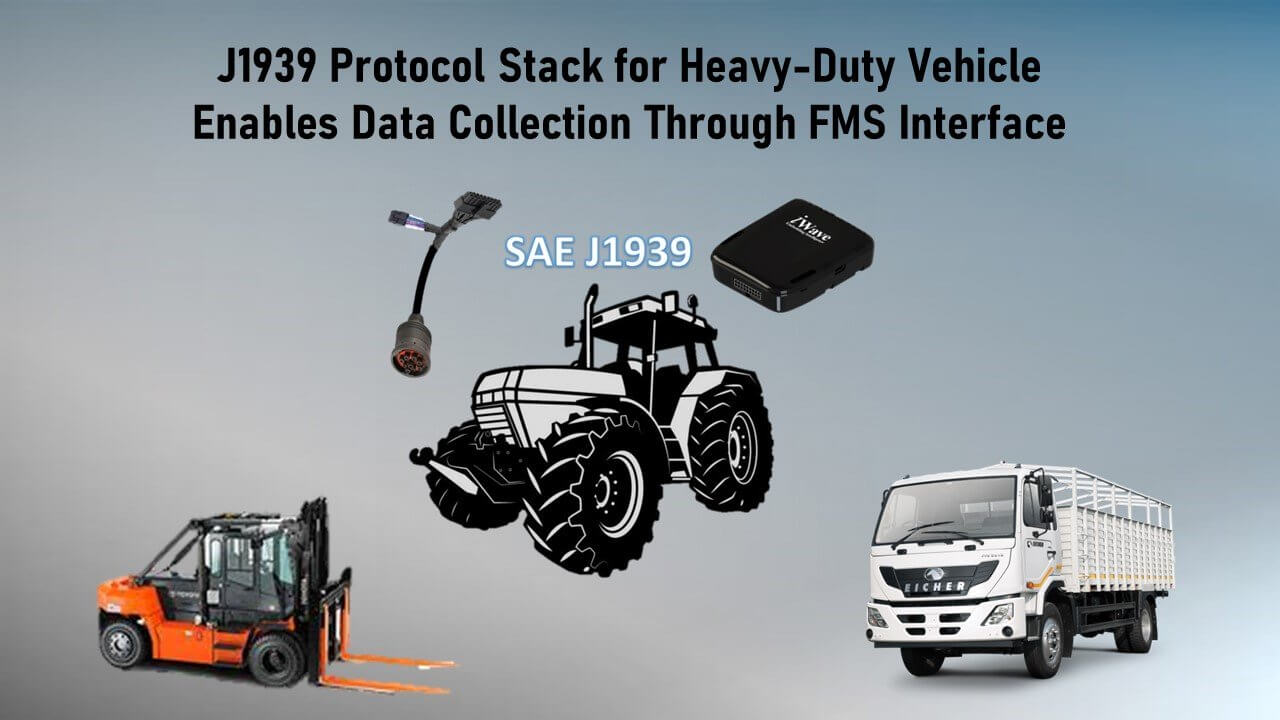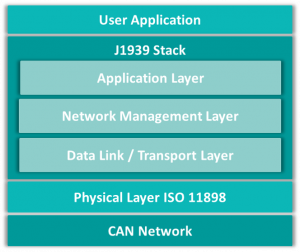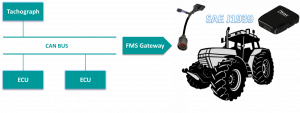J1939 Protocol Stack for Heavy-Duty Vehicle enables data collection through FMS interface
In order to support analytics and diagnostics in CAN Based heavy-duty vehicles like trucks and buses, iWave has developed the SAE J1939 stack, enabling simple and customizable APIs for handling diagnostics data over the SAE J1939 CAN network. SAE J1939 is a set of standards that define how ECU’s communicate via the CAN bus in heavy-duty vehicles. The SAE J1939 stack developed by iWave, based on the ANSI C standard, supports all the specifications of the SAE J1939 protocol needed for collecting data from buses and trucks. The stack works with an extended 29-bit CAN identifier with all the standard baud rates (100kbps, 125kbps, 250kbps, 500kbps, and 1000kbps) supported. The iWave stack implements an auto baud rate detection mechanism which allows the external diagnostic tool/data logger device to find the baud rate supported by the vehicle and initiates the communication between the device and vehicle ECU. The stack facilitates the device to interpret all types of SAE J1939 standard messages including broadcast messages, peer-to-peer messages acknowledgment messages, and multi-frame messages from the Vehicle ECU.
iWave’s SAE J1939 stack provides well-defined APIs for each layer involved in the standard (Datalink, Network management, Application, and Diagnostics layers) with all the services provided by the respective layers. The stack facilitates customization according to the customer requirement, integrating customer-specified feature sets and fine-tuning to meet end application requirements. Our comprehensive software development solutions involving protocol stack development, integration, optimized configuration tuning, and application development ensure faster deployment and time to market of the solution.
With the SAE J1939 protocol stack, the external diagnostic/data logger device can communicate directly with the heavy-duty vehicle ECUs and retrieve all critical parameters specified in the standard. All the Parameters such as speed, engine data, and different types of Diagnostic trouble codes are provided in a readable format that can be used by customer-specified cloud-based applications for analysis. Any rare occurrences /defects can be easily detected by analyzing the diagnostic trouble codes and the driver/vehicle behavior can be observed by analyzing the different parameters, thereby enabling efficiency in the vehicle’s remote management and overall performance. SAE J1939 stack supports an address claim feature that defines a procedure for assigning source addresses to J1939 ECUs after network initialization via an 8-bit address in a dynamic way.
Key features of SAE J1939 CAN Stack are:
- Based on ANSI C source code
- MISRA C compatible
- Peer-to-peer messages and broadcast communication
- Standardized messages for the overall vehicle communication
- Has point-to-point addressing (node addressing) and global addressing (message addressing)
- Maximum reliability
- Excellent error detection & fault confinement
- Collision-free bus arbitration
- Supports vehicle diagnostics with the support of J1939 diagnostic layer services
- Supports Multi-frame message handling
- Customizable stack features
- ECU addressing feature
iWave SAE J1939 software stack provides an efficient way to read FMS (Fleet Management System) standard parameters as well. The FMS interface is an optional interface of different truck manufacturers. Supporting information is dependent upon vehicle ECU. The FMS interface is the sole interface for a safe data connection to the internal network. The FMS data can be combined with the J1939 data, such as GPS position, Tachograph data, sensor readings, which provides a universal communication and information source.
The following data is broadcast at the FMS interface of the truck brand and standardized to SAE J1939 so you can use a single system supporting both standards.
- Accelerator pedal position (0–100%)
- Axle weight (kg)
- Brake switch (on/off)
- Clutch switch (on/off)
- Cruise control (on/off)
- Engine coolant temperature
- Engine speed
- FMS-Standard software version (supported modes)
- Fuel level (0–100%)
- High-resolution vehicle distance
- Power take-off (PTO) (Status/Mode)
- Service distance
- Tachograph information
- Total engine hours (h)
- Total fuel used (litres since lifetime)
- Vehicle identification number (ASCII)
- Vehicle improvement (all round)
- Vehicle speed (wheel based)
- Vehicle speed (from tachograph)
iWave Expertise:
iWave designed the stack to be fully customizable, allowing users to specify feature sets and fine-tune the stack to meet end application requirements. J1939 protocol stack has been deployed globally for commercial vehicle applications.
Value proposition of J1939 protocol stack:
- Easy to Use APIs
- End to End solution offerings for Telematics Solutions
- Supported in all available kernel versions.
- Development of APIs for integration with customer-specific hardware platform and application
For further information or enquiries, you can reach us at mktg@iwavesystems.com or contact our Regional Partners.




